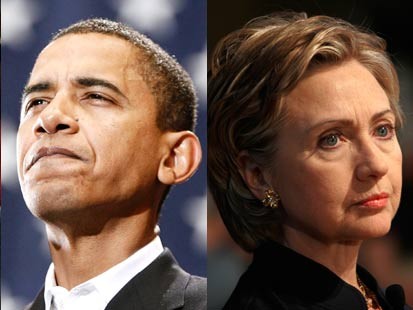Why Obama Beat Clinton
AP’s Stephen Ohlemacher explains why Barack Obama, the young upstart, is going to be the Democratic Party nominee for president while Hillary Rodham Clinton, the hands-down favorite, is getting a set of steak knives.

Unlike Hillary Rodham Clinton, rival Barack Obama planned for the long haul. Clinton hinged her whole campaign on an early knockout blow on Super Tuesday, while Obama’s staff researched congressional districts in states with primaries that were months away. What they found were opportunities to win delegates, even in states they would eventually lose.
Obama’s campaign mastered some of the most arcane rules in politics, and then used them to foil a front-runner who seemed to have every advantage—money, fame and a husband who had essentially run the Democratic Party for eight years as president. “Without a doubt, their understanding of the nominating process was one of the keys to their success,” said Tad Devine, a Democratic strategist not aligned with either candidate. “They understood the nuances of it and approached it at a strategic level that the Clinton campaign did not.”
Careful planning is one reason why Obama is emerging as the nominee as the Democratic Party prepares for its final three primaries, Puerto Rico on Sunday and Montana and South Dakota on Tuesday. Attributing his success only to soaring speeches and prodigious fundraising ignores a critical part of contest. Obama used the Democrats’ system of awarding delegates to limit his losses in states won by Clinton while maximizing gains in states he carried. Clinton, meanwhile, conserved her resources by essentially conceding states that favored Obama, including many states that held caucuses instead of primaries. In a stark example, Obama’s victory in Kansas wiped out the gains made by Clinton for winning New Jersey, even though New Jersey had three times as many delegates at stake. Obama did it by winning big in Kansas while keeping the vote relatively close in New Jersey.
[…]
The system enables strong second-place candidates to stay competitive and extend the race—as long as they don’t run out of campaign money. “For people who want a campaign to end quickly, proportional allocation is a bad system,” Devine said. “For people who want a system that is fair and reflective of the voters, it’s a much better system.”
[…]
A more subtle change was the distribution of delegates within each state. As part of the proportional system, Democrats award delegates based on statewide vote totals as well as results in individual congressional districts. The delegates, however, are not distributed evenly within a state, like they are in the Republican system. Under Democratic rules, congressional districts with a history of strong support for Democratic candidates are rewarded with more delegates than districts that are more Republican. Some districts packed with Democratic voters can have as many as eight or nine delegates up for grabs, while more Republican districts in the same state have three or four.
The system is designed to benefit candidates who do well among loyal Democratic constituencies, and none is more loyal than black voters. Obama, who would be the first black candidate nominated by a major political party, has been winning 80 percent to 90 percent of the black vote in most primaries, according to exit polls. “Black districts always have a large number of delegates because they are the highest performers for the Democratic Party,” said Elaine Kamarck, a Harvard University professor who is writing a book about the Democratic nominating process. “Once you had a black candidate you knew that he would be winning large numbers of delegates because of this phenomenon,” said Kamarck, who is also a superdelegate supporting Clinton.
In states like Ohio and Pennsylvania, Clinton won the statewide vote but Obama won enough delegates to limit her gains. In states Obama carried, like Georgia and Virginia, he maximized the number of delegates he won. “The Obama campaign was very good at targeting districts in areas where they could do well,” said former DNC Chairman Don Fowler, a Clinton superdelegate from South Carolina. “They were very conscious and aware of these nuances.”
But, Fowler noted, the best strategy in the world would have been useless without the right candidate. “If that same strategy and that same effort had been used with a different candidate, a less charismatic candidate, a less attractive candidate, it wouldn’t have worked,” Fowler said. “The reason they look so good is because Obama was so good.”
It’s supremely ironic, though, that the legacy candidate, with every resource imaginable available to her, didn’t understand the rules while the neophyte mastered them from the outset.
About those steak knives: Tim Shipman, writing for the London Telegraph reports that Obama is offering Clinton a “negotiated surrender” at a level far, far less lucrative than is ordinarily awarded to close second place finishers.
The former First Lady would get the chance to pilot Mr Obama’s reforms of the American healthcare system if she agrees to clear the path to his nomination as Democratic presidential candidate. Senior figures in the Obama camp have told Democrat colleagues that the offer to Mrs Clinton of a cabinet post as health secretary or to steer new legislation through the Senate will be a central element of their peace overtures to the New York senator.
[…]
After today’s primary election in Puerto Rico and Tuesday’s final contests in Montana and South Dakota, the remaining super-delegates will come under huge pressure from fellow party grandees to declare their hands. The Obama camp, however, remains nervous about Mrs Clinton’s intentions and ambitions, and is preparing a face-saving package that will allow her to continue to play a role in health care reform, which has been her signature issue for more than a decade. Despite pressure from some Clinton allies, Mr Obama and his advisers do not wish to ask her to be his vice-presidential running mate. “They will talk to her,” one Democrat strategist close to senior figures in the Obama camp told The Sunday Telegraph. “They will give her the respect she deserves. She will get something to do with health care, a cabinet post or the chance to lead the legislation through the Senate.”
Another Democrat who has discussed strategy with friends in the Obama inner circle said that Mr Obama was openly considering asking Mrs Clinton to join his cabinet, alongside two other former presidential rivals: John Edwards, who is seen as a likely attorney general; and Joe Biden, who is a leading contender to become Secretary of State.
Edwards and Biden together won essentially the same number of delegates as my cats, Scamp and Henry. Yet they’re being considered for far more prestigious posts than Clinton, who has taken Obama to the wire. I’m guessing that such an offer would actually serve to stoke her desire to keep fighting to the bitter end.
Her campaign’s feigned outrage over a rather generous settlement yesterday in the dispute over the Florida and Michigan ballots is another indicator of that intention.
To jeers and boos that showcased deep party divisions, Democratic Party officials agreed Saturday to seat delegates from the disputed Florida and Michigan primaries at the party’s convention in August but give them only half a vote each, dealing a setback to Senator Hillary Rodham Clinton.
The agreement, reached by the rules committee of the Democratic National Committee behind closed doors and voted on publicly before a raucous audience of supporters of the two candidates, would give Mrs. Clinton a net gain of 24 delegates over Senator Barack Obama. But this fell far short of her hopes of winning the full votes of both delegations and moved the nomination further out of her reach. She now lags behind Mr. Obama by about 176 delegates, according to The New York Times’s tally, in the final weekend of campaigning before the nominating contests end. Mrs. Clinton, who led the voting in the Michigan and Florida contests, which were held in defiance of party rules, picked up 19 delegates more than Mr. Obama in Florida and 5 delegates more than Mr. Obama in Michigan.
The deal prompted one of her chief advisers, Harold Ickes, a member of the rules committee himself, to declare that Mrs. Clinton’s fight may not be over, even though Mr. Obama’s advisers say he is only days away from gaining enough delegates to claim the nomination. “Mrs. Clinton has instructed me to reserve her rights to take this to the credentials committee,” Mr. Ickes said before the final vote, raising the specter of a fight until that committee meets. His words drew cheers from Clinton supporters, including many who yelled, “Denver! Denver! Denver!” — implying that the fight could go all the way to the convention in that city.
Or beyond.





Because he is Slickwilly Jr! being married to the Slickwilly Sr is the only reason she takes any votes away form the second coming.
Could it be Dems are just sappy? Obama offers warm and fuzzy while Clinton talks more policy. How can college kids get exited about real governing? How can old hippies not support a socialist? Feelings trump common sense on the left.
Hey, if the occupation of Iraq had been planned like Obama’s team planned his campaign, our guys would all be home now.
And Steve, I like you man, but please n.b. that the GOP is nominating JOHN MCCAIN. Don’t talk to me about “sappy” Dems.
Outstanding post like this is why I read your blog.
Or could it be that BHO’s winning had much more to do with HRC (the self proclaimed smartest politician in the world) running a less than stellar campaign and loosing rather than him running a brilliant campaign to beat her? Either way it looks like we will be denied the threat of having such a brilliant politician as our president. Blessing do occur when you least expect them!
Of course Republicans/conservatives eat stories like this up with a spoon…they have to grasp at whatever straws they can to justify how their nominee will somehow, someway hold onto the presidency for their party…